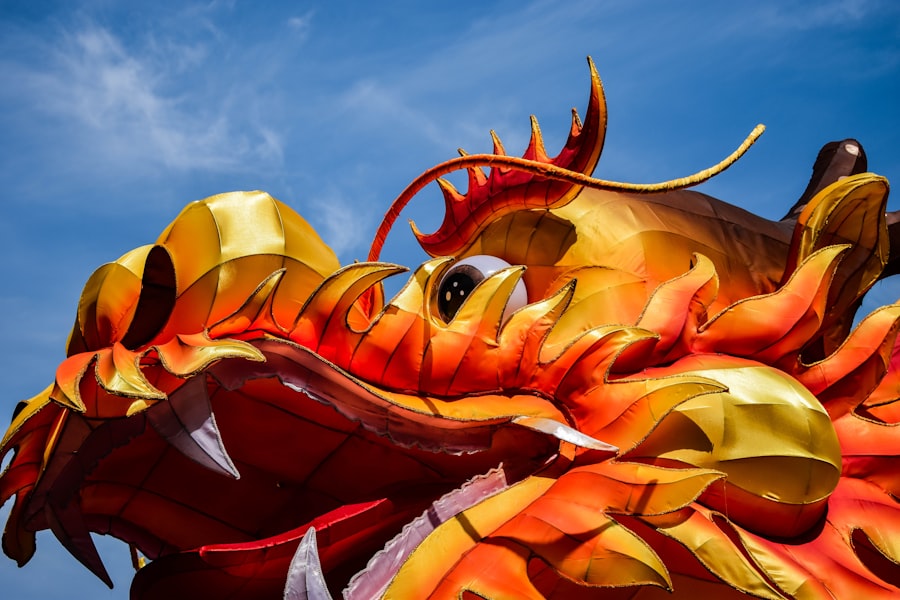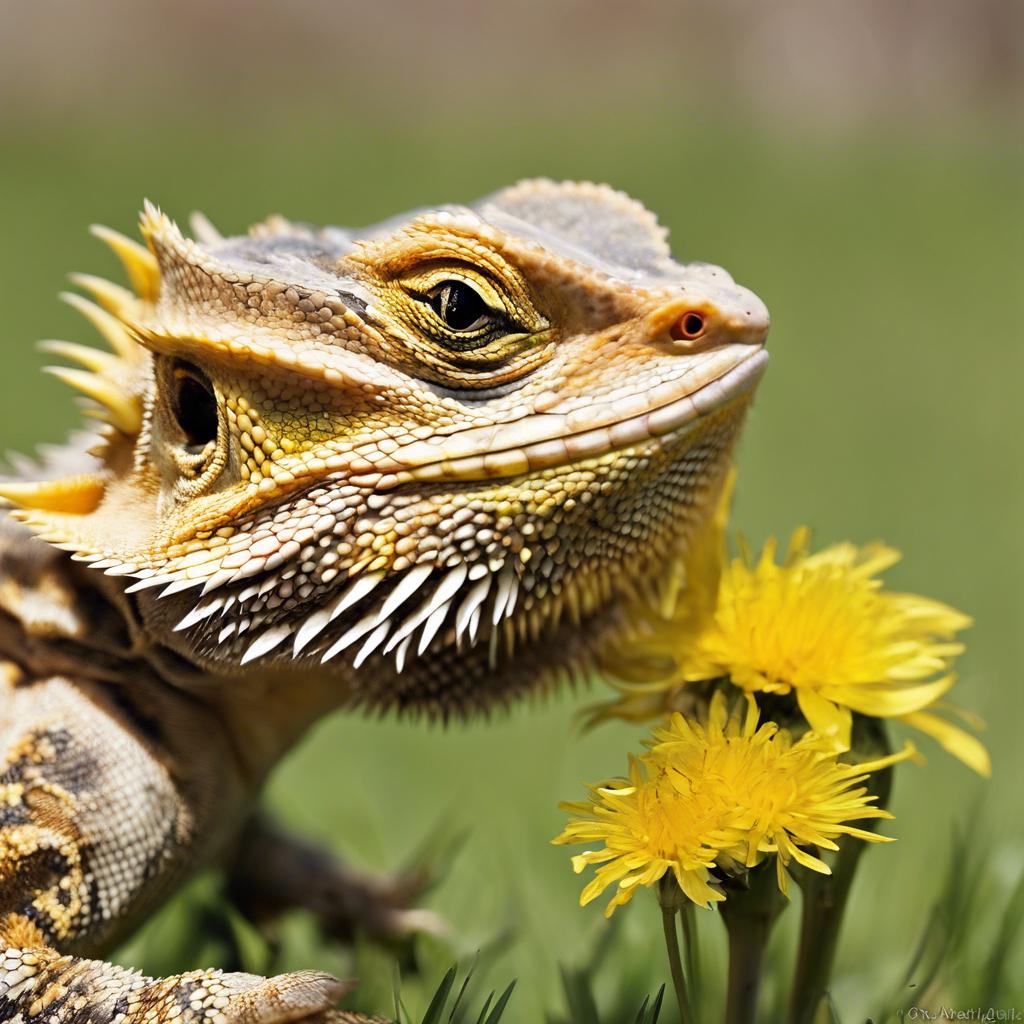Bearded dragons are popular reptile pets known for their unique appearance and docile nature. These lizards are native to Australia and have become increasingly popular as pets due to their low maintenance requirements and friendly demeanor. One of the most important aspects of caring for a bearded dragon is providing them with a balanced diet that meets their nutritional needs.
A balanced diet is crucial for the overall health and well-being of bearded dragons. These reptiles require a combination of protein, vegetables, fruits, and leafy greens to thrive. Providing a varied diet ensures that they receive all the necessary nutrients to support their growth, development, and immune system.
Key Takeaways
- Bearded dragons can benefit from the nutritional value of dandelions in their diet.
- Dandelions should be fed to bearded dragons in moderation and as part of a balanced diet.
- Factors such as age, health, and size should be considered when feeding bearded dragons dandelions.
- Dandelions can be prepared for bearded dragons by washing and chopping them into small pieces.
- Other greens such as collard greens and kale can be used as alternatives to dandelions for bearded dragons.
Nutritional Benefits of Dandelions for Bearded Dragons
Dandelions are a nutritious and readily available food source for bearded dragons. They are high in fiber, which aids in digestion and helps prevent constipation. Dandelions also contain essential vitamins such as vitamin A, vitamin C, and vitamin K, which are important for maintaining a healthy immune system and promoting overall well-being.
Unlike some other greens, dandelions are low in oxalates and goitrogens. Oxalates can interfere with calcium absorption, leading to metabolic bone disease in reptiles. Goitrogens can interfere with thyroid function if consumed in large quantities. The low levels of these substances in dandelions make them a safe and healthy option for bearded dragons.
Frequency of Dandelion Consumption for Bearded Dragons
The frequency of feeding dandelions to bearded dragons depends on several factors, including the age and size of the dragon, as well as other foods in their diet. As a general guideline, adult bearded dragons can be fed dandelions two to three times per week, while younger dragons may benefit from more frequent feedings.
It's important to note that dandelions should not make up the majority of a bearded dragon's diet. They should be offered as part of a varied and balanced diet that includes other leafy greens, vegetables, fruits, and protein sources. Overfeeding dandelions or any other food can lead to digestive issues and nutritional imbalances.
Factors to Consider When Feeding Bearded Dragons Dandelions
When feeding dandelions to bearded dragons, it's important to consider their age and size. Younger dragons may require more frequent feedings and smaller portions, while adult dragons can handle larger quantities less frequently. Adjusting the portion size and frequency of dandelion feedings based on the dragon's age and size ensures they receive the appropriate amount of nutrients.
It's also important to consider the other foods in a bearded dragon's diet. Dandelions should be offered alongside a variety of other leafy greens and vegetables to provide a well-rounded nutritional profile. This helps prevent nutrient deficiencies and ensures the dragon receives all the necessary vitamins and minerals.
The quality and source of dandelions should also be taken into account. It's best to use organic dandelions that have not been treated with pesticides or herbicides. Avoid picking dandelions from areas where they may have been exposed to pollutants or chemicals.
How to Prepare Dandelions for Bearded Dragons
Before feeding dandelions to bearded dragons, it's important to properly prepare them. Start by washing the dandelions thoroughly to remove any dirt or debris. It's best to use a mild soap or vegetable wash specifically designed for cleaning produce.
After washing, dry the dandelions thoroughly to remove excess moisture. Wet greens can lead to digestive issues in reptiles, so it's important to ensure they are completely dry before serving them to your bearded dragon.
Next, chop or shred the dandelions into small, bite-sized pieces. This makes it easier for the dragon to eat and digest the greens. Bearded dragons have small mouths and may struggle to eat large pieces of food.
Finally, serve the dandelions fresh or cooked. Some bearded dragons prefer their greens raw, while others may enjoy them lightly steamed or sautéed. Experiment with different preparation methods to see what your dragon prefers.
Alternatives to Dandelions for Bearded Dragons

While dandelions are a healthy addition to a bearded dragon's diet, there are also other leafy greens and vegetables that can be fed to provide variety and additional nutrients. Some suitable alternatives include collard greens, mustard greens, turnip greens, kale, and Swiss chard.
Each of these greens has its own nutritional profile, so it's important to offer a variety to ensure the dragon receives a wide range of nutrients. For example, collard greens are high in calcium, while kale is rich in vitamin K. By rotating different greens in their diet, bearded dragons can benefit from a diverse array of vitamins and minerals.
Risks of Overfeeding Dandelions to Bearded Dragons
While dandelions are a nutritious food source for bearded dragons, it's important to avoid overfeeding them. Overfeeding dandelions or any other food can lead to digestive issues such as diarrhea or constipation. It can also result in nutritional imbalances if the dragon's diet becomes too heavily reliant on one type of food.
To prevent overfeeding, it's important to offer dandelions as part of a varied diet that includes other leafy greens, vegetables, fruits, and protein sources. This ensures that the dragon receives all the necessary nutrients without overloading on any one particular food.
Signs of Digestive Issues in Bearded Dragons
It's important to monitor a bearded dragon's health and watch for signs of digestive issues. Some common symptoms of digestive issues in bearded dragons include changes in appetite, weight loss, diarrhea, constipation, or abnormal stool consistency.
If you notice any of these symptoms, it's important to consult a veterinarian who specializes in reptile care. They can provide guidance on how to address the issue and make any necessary adjustments to the dragon's diet.
Balancing a Bearded Dragon's Diet with Dandelions
To ensure a balanced diet for a bearded dragon, it's important to offer a variety of foods in addition to dandelions. Leafy greens such as collard greens, mustard greens, and kale should make up the bulk of their vegetable intake. These greens are high in calcium and other essential nutrients.
In addition to leafy greens, bearded dragons can also be fed a variety of vegetables such as bell peppers, carrots, squash, and sweet potatoes. These vegetables provide additional vitamins and minerals and add variety to the dragon's diet.
Protein sources such as insects and worms should also be included in a bearded dragon's diet. Crickets, mealworms, and dubia roaches are all suitable options. These protein sources should be dusted with a calcium supplement before being offered to the dragon.
Dandelions as a Healthy Addition to a Bearded Dragon's Diet
In conclusion, dandelions are a nutritious and beneficial addition to a bearded dragon's diet. They are high in fiber and vitamins while being low in oxalates and goitrogens. Dandelions can aid in digestion, support the immune system, and provide essential nutrients for overall health.
When feeding dandelions to bearded dragons, it's important to consider their age and size, as well as the other foods in their diet. Dandelions should be prepared by washing, drying, chopping or shredding, and serving fresh or cooked. It's also important to offer a variety of other leafy greens, vegetables, fruits, and protein sources to ensure a balanced diet.
By incorporating dandelions and other nutritious foods into a bearded dragon's diet, owners can provide their pets with the necessary nutrients for optimal health and well-being. Remember to always monitor the dragon's health and consult a veterinarian if any digestive issues arise. With proper care and a balanced diet, bearded dragons can thrive and live long, healthy lives.
If you're curious about how often bearded dragons can eat dandelions, you might find this article on Reptile Wizard's blog quite informative. It discusses the dietary requirements of bearded dragons and provides insights into incorporating dandelions into their meals. To learn more about this topic, check out the article here. Additionally, if you have any further questions or need expert advice on reptile care, feel free to reach out to Reptile Wizard through their contact page here.
FAQs
What are bearded dragons?
Bearded dragons are a type of lizard that are commonly kept as pets. They are native to Australia and are known for their distinctive appearance, which includes a spiky beard-like projection under their chin.
Can bearded dragons eat dandelions?
Yes, bearded dragons can eat dandelions. In fact, dandelions are a nutritious food source for these lizards and can be a good addition to their diet.
How often can bearded dragons eat dandelions?
Bearded dragons can eat dandelions as often as once or twice a week. However, it is important to ensure that dandelions are not the only food source in their diet and that they are getting a balanced mix of other vegetables, fruits, and insects.
What are the nutritional benefits of dandelions for bearded dragons?
Dandelions are a good source of vitamins and minerals that are important for bearded dragons. They contain high levels of calcium, which is essential for healthy bones and teeth, as well as vitamin A, which is important for maintaining healthy skin and eyes.
Are there any risks associated with feeding bearded dragons dandelions?
While dandelions are generally safe for bearded dragons to eat, it is important to ensure that they are not contaminated with pesticides or other chemicals. It is also important to avoid feeding bearded dragons dandelions that have been picked from areas where there may be pollution or other environmental hazards.

